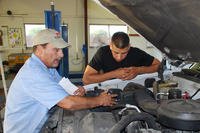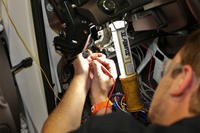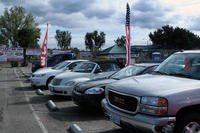The U.S. military's moving season is here again. You've got your orders, you've researched your next duty station, and moving boxes are sprouting like springtime flowers all over your barracks room, apartment or house.
But how does everything, you know, actually get there? There could be thousands of miles between this assignment and your next one, and covering that distance with all your worldly possessions like some kind of dust-bowl hobo is a daunting task. We're here to take some of the stress out.
If you haven't already, head over to our definitive PCS checklist to make sure your house, belongings and paperwork are all squared away well in advance. Your branch of service might have resources, too, so see what the Army, Navy, Marine Corps and Coast Guard have to offer (I assume the Air Force provides a concierge service/wine sommelier, so none of this matters).
Once that's taken care of, you can focus on planning for the move itself by getting your car in tip-top shape.
Make A Budget

The military will pay you to move -- great! As always, there are hoops you have to jump through and criteria you have to meet, though, so don't assume that the government will simply fork over a pile of cash with no strings attached.
Once you know how much money you have to work with, start by tallying up your planned expenses. You'll need a moving truck, trailer or shipping container to move your belongings. You'll have to pay for hotels, meals and fuel along the way. Calculate in as much detail as possible, using your car's observed miles per gallon, state-by-state average fuel prices and specific hotel rates.
This is also the time to pay for any car maintenance you've been putting off. Midway through a PCS move is no time to realize that your tires only had 100 miles of tread left when you started the trip.
All this number-crunching can be a hassle, but it's worth your time. If you're cost-conscious and willing to do the heavy lifting yourself, you can usually pocket some of the PCS allotment for yourself. Consider that payment for your labor and overall moving anguish.
Prep Your POV

If you're going to drive to your next duty station, ensure that your vehicle is capable of making the journey.
Start with easy tasks. Replace wiper blades because they're cheap and will make a huge difference in safety if you run into bad weather. Check your headlights, taillights and turn signals, and replace any bulbs that are broken or weak. Score brownie points with yours truly by throwing a coat of wax on your car after you wash it -- glass included -- to protect the paint and get rain off your windshield and windows as quickly as possible.
Look at your tires. Is there enough tread depth to hide the top of Abe Lincoln's head if you use the old penny test? While you're down there, look for a four-digit date code. This will be in a "WWYY" format that indicates the week and year your tire was manufactured. If your tires are more than six years old, Discount Tire says it's time for a fresh set -- and don't forget to replace the spare, if you have one. They have a small military discount to ease the pain.
Take care of basic maintenance so you don't need to service your car along the way or miss a maintenance interval. Change your oil if you're coming up on a scheduled oil change. Measure the thickness of your brake pads to make sure they have plenty of life left in them, and consider replacing your pads and rotors together.
If you haven't flushed your coolant or brake fluid recently (most people neglect these maintenance items), it's probably time. You're better off spending the money now than spending it later, in addition to paying for a tow truck and showing up late to your new command.
If you're feeling ambitious, look for wobbly ball joints and tie rod ends by jacking up your car and trying to move each wheel. If it moves with your hands at the 12- and 6-o'clock positions, the ball joints are shot. If you can move the wheel with your hands at 3 o'clock and 9 o'clock, that's a sign of worn-out tie rod ends. Replacing these parts may or may not be a job you want to attempt at your base's auto skills center, but at least you'll know what to ask for when you bring it to a mechanic.
Since you'll need to register your car at your new duty station, make sure your vehicle is ready to pass muster. Keep your title, registration and insurance someplace safe and handy; i.e., not in a storage container you can't access. If you'll be required to pass a state smog inspection at your next duty station, make sure your emissions equipment is intact and you don't have a check engine light on your dash. Some modifications and even factory-original features can kill your chances of registering your car outright (looking at you, California). Find out what those are and have a plan to return your car to stock or -- cough, cough -- find a work-around.
Trailer vs. Truck vs. Shipping Container

You basically have three options when it comes to a personally procured move (PPM): Rent a trailer to tow behind your truck or SUV, rent a moving truck or schedule a shipping container. All three have pros and cons.
If you live in a barracks or one-bedroom apartment and only have a few possessions, you can get away with renting a cargo trailer as long as your vehicle can tow it. This is a good way to free up space in your vehicle and keep your belongings more secure than they'd be in an open truck bed.
For families with more possessions to transport, renting a moving truck is usually the best option. They're miserable to drive, but they provide the most flexibility both in terms of your moving timeline and the size of the truck you choose. Budget and Penske offer military discounts on moving trucks.
The least labor-intensive option is to schedule a shipping container with a moving company such as PODS (save up to 25% with a military discount). You'll be locked into pickup and drop-off dates and pay out the nose, but the hassle of schlepping your belongings across the country will be totally eliminated. The best part? If you have a housing gap, PODS will store your container until you're ready to receive it -- say goodbye to storage units.
Put Your Car on a Trailer
If you rent a moving truck, you can probably get your vehicle to your new duty station without putting a single mile on the odometer. Moving companies such as Budget, Penske and U-Haul rent car carriers and dollies that you can tow behind your moving truck.
If you take this route, the first consideration is your vehicle's weight. The truck you rent will have to be capable of towing the combined weight of the trailer and your car.
The specific type of vehicle you own also makes a difference. You can tow some cars by the front wheels with a dolly, but this will destroy an all-wheel drive system. If your car is all-wheel drive, you'll need a car carrier that gets all four wheels off the ground.
You can rent motorcycle trailers, too. Unless you have a pickup with a long enough bed for your bike (most newer beds are too short), this is the best way to get all your vehicles across the country.
Do Your Route Reconnaissance

Once your car and household goods are taken care of, you can plan your route. Don't leave it to Google Maps; a little bit of homework can save you time and headaches on the road.
Do some digging to see whether portions of your route are under construction. Maybe it's avoidable, maybe it's not, but miles of orange cones and gridlock are not something you want to stumble across when you're fighting to stay on schedule.
The same goes for the weather; check the forecast early and often. I once got delayed in Wyoming because a May blizzard shut down the highway. Another time, flooding in Ohio threatened to make me late for my report date to Fort Meade, Maryland. Find out what problems you could run into (snow, hurricanes, flooding, you name it) and adjust your route, if necessary.
You might not want to book hotel rooms in advance in case you get delayed, but a quick news search can ensure that you'll get a room when you need one. You'd hate to roll into the only hotel for miles, only to find out that there's a high school baseball tournament in town and the whole thing's booked.
Some hotels, such as Hampton, Hilton, Marriott and La Quinta, offer military discounts. If you want to turn your PCS move into a mini vacation, mix things up with a discounted Airbnb rental along the way. We have a huge list of lodging discounts where service members can find other hotel bargains.
Don't forget that military installations might be able to put you up for a night during your trip. Temporary on-base lodging reservations can save you money and open the door to some pretty sweet digs.
Spread the Word
You're not the only one seeking help with an upcoming PCS move. Once you learn the ropes and put all this advice to use, share your experience with someone who's about to embark on a move of their own. We can all help make PCS season a little less stressful.
Keep Up-to-Date for Your Next PCS
Get the inside information from those who know. Get PCS help and all the news and benefits information you need delivered straight to your inbox. Subscribe to Military.com now.











